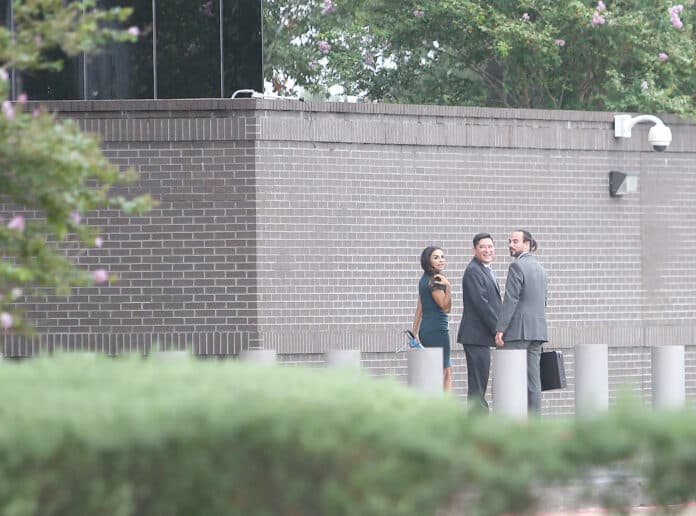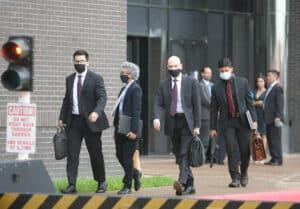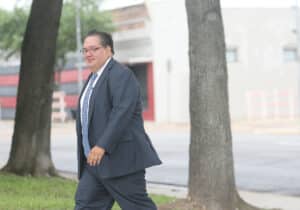
McALLEN — The three men accused of conspiring together to defraud the city of Weslaco out of millions of dollars are set to finally have their day in federal court this fall.

(Dina Arévalo | [email protected])
Former Precinct 1 Hidalgo County Commissioner Arturo “A.C.” Cuellar; Daniel J. Garcia, an attorney and school board member from Rio Grande City; and Weslaco businessman Ricardo “Rick” Quintanilla are set to go to trial in mid-September.
The trio stand accused of working together in a bribery scheme that allegedly allowed them to skim millions of dollars for themselves that had been earmarked for the city of Weslaco’s water and wastewater treatment facilities.
Prosecutors unveiled dozens of charges against the three men in a 34-page superseding indictment unsealed in April 2019. But the case, which has been referred to as “voluminous,” has seen numerous delays in being brought forward to trial.
Less than two months after the indictment was unsealed, U.S. District Judge Micaela Alvarez granted a motion from prosecutors to declare the case “complex” — a designation that allows for exemptions to a defendant’s right to a speedy trial.
Then in 2020, the emergence of the COVID-19 pandemic forced the closure of the federal courthouse to the public. And as large gatherings could serve to foster transmission of the deadly virus, things such as empaneling a jury, hosting multiple defendants and their defense teams, and seating witnesses became an impossibility.

(Dina Arévalo | [email protected])
The case suffered another setback in November 2020 when former Rio Grande City Municipal Judge Leonel Lopez Jr. died of cancer. Lopez had been expected to serve as one of the prosecution’s key witnesses.
Lopez, along with former Weslaco City Commissioner Gerardo “Jerry” Tafolla, had each pleaded guilty to federal programs bribery in relation to the scheme just days before the indictment against Cuellar, Quintanilla and Garcia was unsealed in 2019.
The indictment also named as a defendant former Weslaco City Commissioner John Cuellar, who later pleaded guilty to count 1 of the 61 individual charges against him. The two Cuellars are cousins.
Efforts to preserve Lopez’s testimony in the days before his death failed, and as the pandemic continued to rage late last year with no vaccine then available, it remained unclear when the trial would proceed.
Now, some eight months after the November status conference where the prosecution’s request to depose Lopez before his death was denied, about 3/4 of the Rio Grande Valley’s population aged 12 and older has been vaccinated against the coronavirus.
Furthermore, the courthouse has reopened and resumed normal operations, and has even begun seating juries on less complex cases.
On Friday, attorneys for the three defendants met across the aisle from a trio of Justice Department prosecutors to hammer out the last set of housekeeping issues before moving forward with trial.
At issue were a series of motions regarding expert witnesses, specific kinds of testimony and evidence, and even a motion to dismiss some of the charges.
With many of the motions filed under seal, however, the discussions between the attorneys and Judge Alvarez were at times difficult to parse.
Among Alvarez’s decisions, however, was a denial of A.C. Cuellar’s motion to dismiss count 9 of the superseding indictment against him, which charges him with federal programs bribery.
Alvarez also ruled on a sealed motion regarding the admissibility of testimony about Lopez’s state of mind.
As part of his plea, Lopez had been cooperating with prosecutors prior to his death. He had spoken with investigators and was expected to testify to his role in the alleged conspiracy. However, with his death, the defense no longer has the opportunity to rebut or impeach his testimony.
Carlos A. Garcia, the attorney representing A.C. Cuellar, spoke to the issue in the weeks leading up to Friday’s motion hearing.
“Under the rules (of federal criminal procedure)… when a person seeks to take a person’s liberty away, one of the guarantees that we have as citizens is the right to confront and cross examine witnesses,” Garcia said.
“If the government were to come in and attempt to produce statements by someone that I have not had the opportunity to cross examine, then that creates a problem, not only for my client, but for every one of us,” he said.
Though the motion regarding Lopez was filed under seal, discussions in open court Friday made clear that the defense sought to exclude witnesses who can testify about Lopez’s state of mind regarding the alleged bribery scheme.
The judge ultimately split her ruling down the middle — affirming that the prosecution cannot put a witness on the stand to testify that Lopez “knew he was participating in a bribery (scheme),” but also ruling that the prosecution can’t be prevented from calling any witnesses at all to testify about Lopez.
“To ask the court to exclude any issue would no doubt be a legal error,” Alvarez said with emphasis.
“He is a co-conspirator even if he is not here to testify,” she said.
However, Jaime Peña, attorney for Quintanilla, argued that the defense is hampered in preparing for such potential testimony because prosecutors have thus far not provided their witness list.
Peña further argued his concern that — in the wake of Lopez’s death — prosecutors would in turn attempt to more heavily rely on the other man who pleaded guilty at the start of this case: Jerry Tafolla.
Peña said he was concerned prosecutors may “try to extrapolate more” testimony from Tafolla to make up for Lopez’s unavailability. He asked the court to consider requiring the two sides to approach the bench prior to any such lines of questioning. The discussion also involved mention of “witness summaries.”
“That’s all I’m trying to do is protect my client… so we don’t get sandbagged,” Peña said.
Alvarez denied Peña’s request, saying, “There is no requirement that the government’s testimony from any witness be fully reduced to writing.”
She revisited the issue a few moments later when discussing the potential testimony of federal agents.
“I think sometimes they are very helpful,” Alvarez said of witness summaries. “That is something that I think depends on how it is presented at trial.”
However, a moment later, she called the requirement of such summaries improper.
Finally, during a discussion about allowing the admission of so-called 404(b) evidence — or character evidence of other acts that may go to prove motive, intent or knowledge of a crime — the prosecution revealed the existence of a recording that allegedly illustrates Quintanilla’s involvement in the water plant bribery scheme, as well as a second case where he is a named defendant.
In that case, Quintanilla and another man, McAllen hotelier Sunil Wadhwani, are charged in a bribery scheme regarding Wadhwani’s building of a Motel 6 in Weslaco.
Wadhwani pleaded guilty in the case last spring. His sentencing has been delayed until the outcome of this case. As in the water plant case, Quintanilla maintains his innocence.
After weighing the pile of motions before her, Alvarez confirmed that the trial remains set for jury selection on Sept. 8, with opening statements set for Sept. 13.
For Garcia, the attorney representing A.C. Cuellar, he and his client are eager to have their day in court.
“The government will always argue that they represent the people… Well, I represent the people as well — I just do it one person at a time,” Garcia said.
“Anyone that knows him (A.C. Cuellar) knows the upstanding citizen that he has been his entire life. It’s been a difficult road for he and his family, but we look forward to the day that we’re able to properly defend the case with the jury and with the facts out there for everyone to hear,” Garcia added a few moments later.



